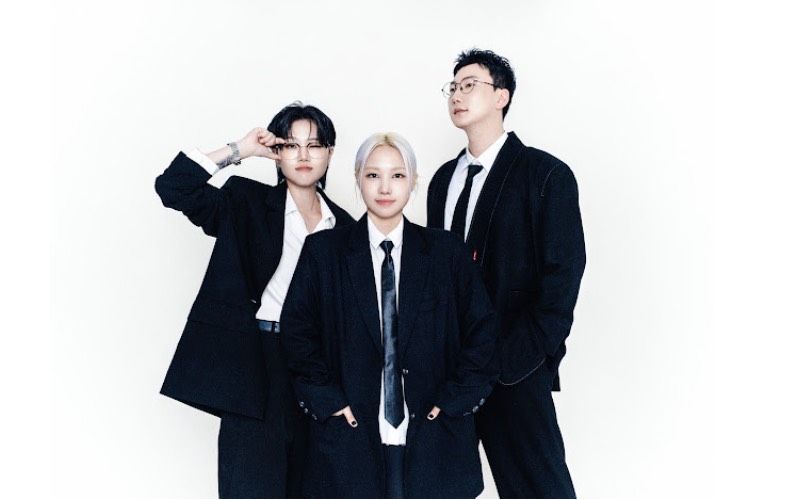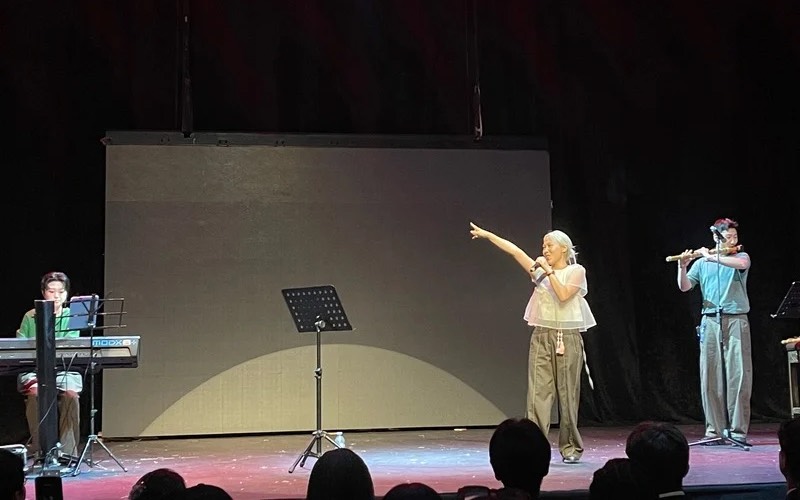Interview with OWNDO’s Leader and Vocalist Ahyoung Kim on the Blending of Korean traditional music and Western music and the Bands Performance at the K- Heritage Festival.
2025-09-24OWNDO is a band that blends Korean traditional and Western music to create a profound resonance, and their performance is electrifying. The band comprises 3 members name Kim Ahyoung for vocals, Choi Jiwoo on the Keyboard and Ha Dongmin for Daegeum. They gained public attention as Top 8 finalists on Channel A’s (Vocal Play) and Top 6 finalists at the JTBC’s ( Poongryu: Battle Between the Vocalist). At the MBC’s Riverside Song Festival, New Challenge, they received the encouragement award. The band was one of the performers at the K-Heritage Festival held on September 19, 2025, which was hosted by the Korean Embassy in Nigeria, in conjunction with the Korean Cultural Centre Nigeria (KCCN), at Terra Kulture, Plot 1376 Tiamiyu Savage Street, Victoria Island, Lagos.
The following are excerpts from an email interview with Ahyoung Kim, the vocalist and leader of OWNDO from September 23 to September 24, 2025.

Watching and listening to your performance and how you blended Korean tradition and Western styles at the K-Heritage Festival held on the 19th of September was intriguing, so my question is, how do you blend and balance the traditional Korean elements with modern Western styles in your music, and what's your creative process like when merging these two distinct genres?
Since childhood, I have studied traditional Korean music, so when forming the band, it was important to me that a traditional instrument be included. That is why we chose the unique combination of piano, daegeum (a traditional Korean bamboo flute), and vocals.
At the same time, I grew up enjoying K-pop, so it feels very natural that both traditional and modern musical styles coexist in my work. When we arrange cover songs, we usually start by rearranging the piece with piano, then add daegeum and vocals to find the right balance in the middle.
At the event, your performance of "Great Korea is Alive" and "Holo Arirang" was captivating to me, and it showcased your group's cultural heritage. My question is, how important is it for you to share Korean culture through your music, and what message do you hope your audience takes away from these songs?
There is a saying in Korea: “The most Korean is the most global.” This originates from Goethe’s words, “The most national is the most international.” I don’t interpret this as claiming any culture is superior, but rather that there is great power in the uniqueness we each carry — the colors we inherit and develop through our own lives.
My wish is to communicate with people through music, beyond national or cultural boundaries. I am always grateful to audiences who embrace and enjoy our music, and if our music can bring joy and comfort to people, that is the greatest reward.

Your performance of Peek-A-Boo and Golden at the K-Heritage Festival was electrifying, and it had the crowd really excited as they sang along. What was that experience like for you, and how do you engage with your audience during live performances?
For many Koreans, Africa still feels like a distant and unfamiliar place, despite how global exchanges have accelerated in the age of the internet. I myself never imagined that my music would bring me all the way to Nigeria. And yet, to hear the crowd singing along in unison, responding with such explosive energy — it was truly like a dream.
I believe it is because "music is one universal language." It made me feel once again the powerful role of culture in connecting people who live far apart, and I felt deeply grateful.
When preparing for performances, I always think carefully about which songs to choose and what to say on stage, because I am genuinely curious about the audience, just as they may be curious about me. That is why I try my best to communicate on stage, even with my limited English.
Also, with your visit to Nigeria, what were your impressions of Nigeria's vibrant cultural scene during your visit, and how did you find the audience's response to your music at the K-Heritage Festival?
The Nigerian audience was truly the best. This is not mere flattery — the level of musical understanding, excitement, and energy you displayed was overwhelming, even more than what we Koreans, often called a “nation of excitement,” are known for. It was something I don’t think I could find anywhere else in the world.
One of my favorite memories was after the concert, when the stage turned into a kind of spontaneous party. Rather than simply following the rhythms of Korean percussion, you expressed your own dances freely within the beat. We were all deeply impressed by that sight.
Looking at the music scene of K-traditional music, Kpop music in Nigeria, what opportunities do you see for future cultural exchanges between Korea and Nigeria?
Nigerian music, including Afrobeats, is already spreading worldwide, just as Korean music, such as K-pop, is doing. From what I saw, there is also a strong appreciation for traditional music. This makes me believe that if direct exchanges between our two countries continue, new and innovative music can be created. Of course, how these opportunities unfold will depend on the organizers and the future of such cultural events. (If you continue to show us such great love and support, we might be able to visit Nigeria again in the near future.)
Finally, we really want to know what is next for OWNDO? Are there any upcoming projects, collaborations, or performances that you're excited about that we should be on the lookout for?
OWNDO already has performance schedules in Korea. Unfortunately, it will be difficult for our international fans to join us there in person. However, after this experience in Nigeria, I am considering exploring new formats such as online or streaming performances so that fans around the world can share the stage with us in real time.
How about this article?
- Like3
- Support1
- Amazing1
- Sad0
- Curious0
- Insightful0


